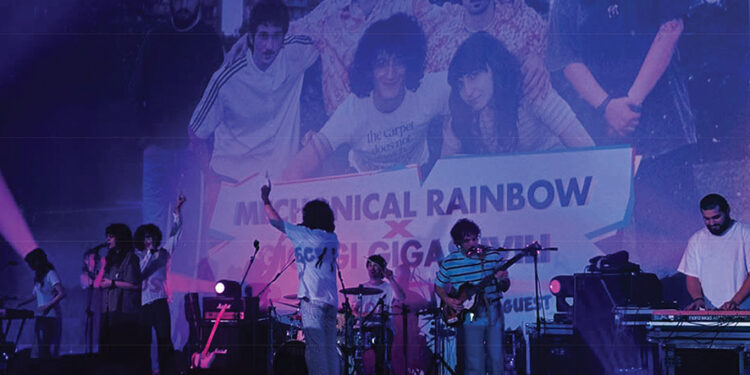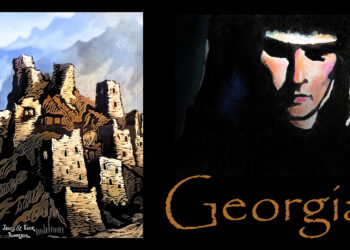Tbilisi’s Amirani Cinema, usually a sanctuary for film lovers, transformed on August 12 into a stage for something different — the premiere of Momende, a fresh collaboration between Mechanical Rainbow and pianist Giorgi Gigashvili, with special guest Nikala. What unfolded was a textured, multi-layered event: part concert, part art happening, part communal ritual. It felt like a conversation across time, genres, and generations; a cultural snapshot of Georgia’s evolving soundscape.
This was not just a music-video launch. It was a live experiment in how Georgian artists today navigate tradition and innovation
The evening opened with Giorgi Gigashvili, whose reputation as a classically trained pianist was on full display in the crystalline beauty of his Ravel and Paliashvili passages. His playing was poised and deliberate without being mannered — each note placed with the precision of someone who understands that restraint can be as moving as flourish. But this was not a recital. Beside him, Nikala — an electronic musician and sound designer — built pulsive, shifting textures around the piano, turning each piece into something both familiar and strangely new. His contributions were not intrusive flourishes, but atmospheric frames, sometimes swelling into the foreground, sometimes dissolving into silence. The result was a dialogue between acoustic clarity and electronic haze — a 21st-century take on the old piano-and-accompaniment format.
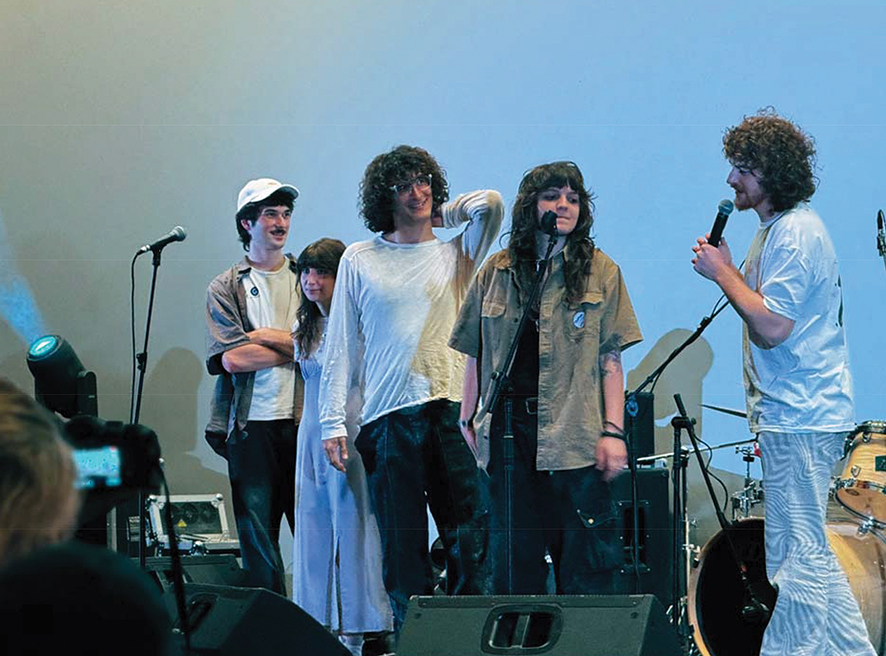
At one point, Gigashvili himself sang, his unpolished but sincere voice carrying through the room with a kind of understated honesty. Later, the audience took over, turning the moment into something between a folk gathering and a sound-art installation. It was less about virtuosity than about presence — the kind of performance that made everyone feel they were co-creating the moment.
When Mechanical Rainbow took the stage, the air changed. Gone were the careful, chamber-like textures of the opening set — in their place came the raw, immediate sound of live guitars, drums, and a frontman whose emotional range could turn from a whisper to a near-shout in the space of a verse. The set was a study in contrasts: tight, deliberate musicianship laced with moments that felt almost reckless in their emotional urgency. If Gigashvili and Nikala had opened the night in a space of measured intimacy, Mechanical Rainbow drove it into full-bodied exuberance. The audience reacted instinctively — heads nodding in sync, bodies leaning forward as if to catch more of the sound, bursts of applause breaking through between songs. It was the kind of music that didn’t need to be understood in order to be felt.
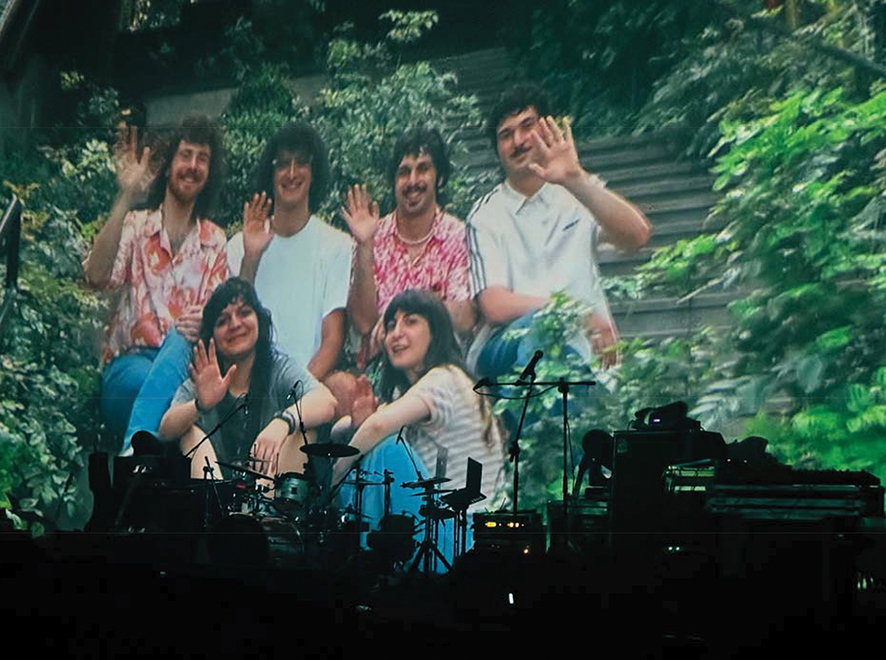
The debut of the Momende music video felt like the natural culmination of the evening’s energies. Visually, it leaned into a distinctly Zoomer sensibility — bright, almost hippy-saturated colors, a kind of knowingly kitsch humor, and Sims-like characters coasting through a park, waving to the camera as though trapped in a loop of cheerful absurdity. It was a love letter to both play and irony, two pillars of contemporary digital culture. Beneath its surface humor, the video hinted at deeper cultural undercurrents: the fluidity of identity, the playful recycling of older aesthetic tropes, and the blurred lines between reality and its online simulacra. In a way, it mirrored the evening itself — a work of art that refused to choose between sincerity and self-awareness.
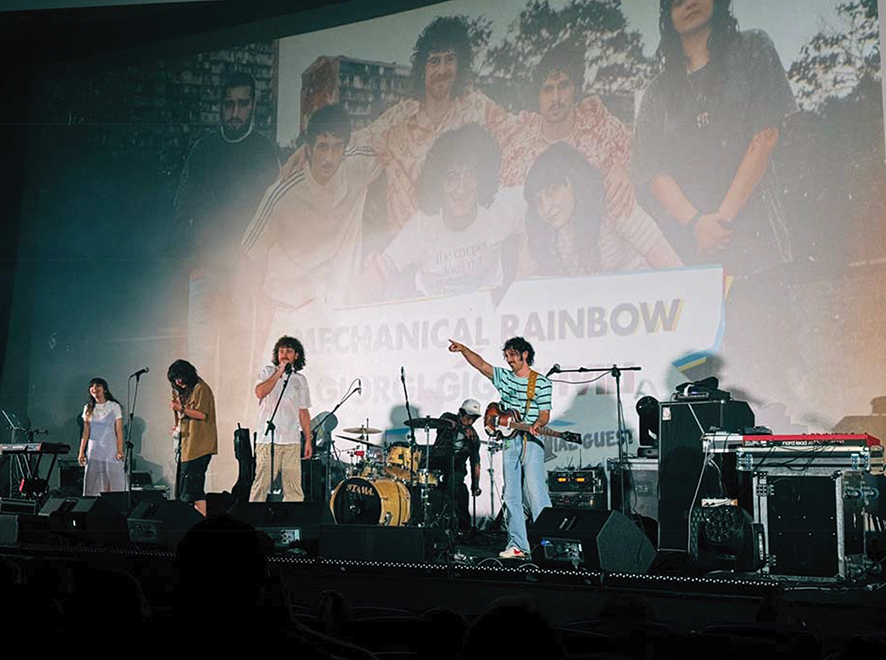
In the final stretch, the performers invited the audience to join them in singing Momende multiple times, each iteration dressed in a different arrangement — one stripped to voices alone, another layered with rich accompaniment. It became a ritual, an act of collective authorship, dissolving the line between stage and crowd. In a time when so much of music consumption is private and algorithmically filtered, there was something almost radical in this shared, physical act of singing together.
It was the kind of music that didn’t need to be understood in order to be felt
This was not just a music-video launch. It was a live experiment in how Georgian artists today navigate tradition and innovation, seriousness and play, the personal and the communal. The setting — a cinema turned concert hall — underlined the hybrid nature of the event, where music could be a site of both deep listening and active participation. From Gigashvili and Nikala’s tender, intimate opening to Mechanical Rainbow’s sprawling sonic adventures and the joyful, multi-voiced renditions of Momende, the night offered a sense of cultural continuity in motion. It was a reminder that music in Georgia today is not frozen in categories, but moves freely between them, creating spaces where the past can converse with the present and where an entire room can become, for a moment, part of the same song.
Review by Ivan Nechaev

